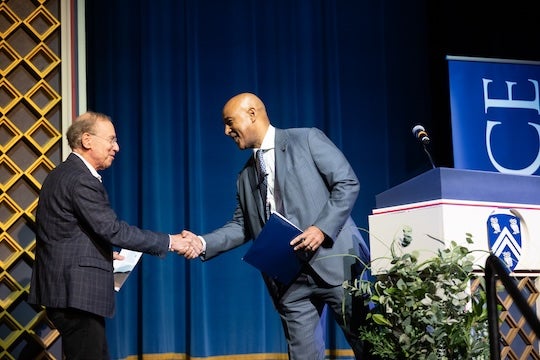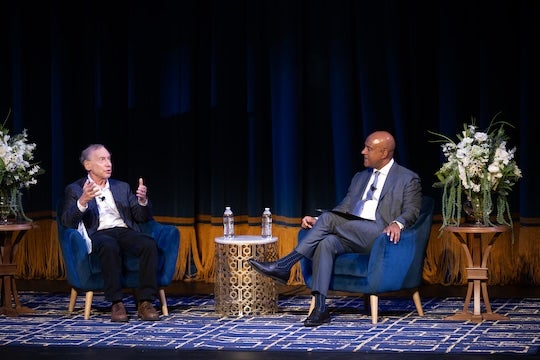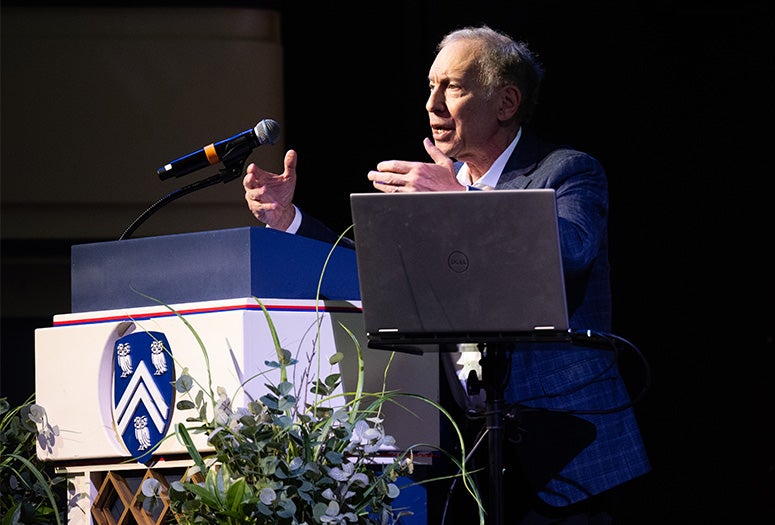Rice University welcomed renowned biomedical engineer and entrepreneur Robert Langer to campus for the President’s Lecture Series, an initiative designed to enrich the intellectual life of the university and the city of Houston. Held at Brockman Hall for Opera May 5, the public event drew a packed audience and came at a moment of increasing momentum for Houston as an emerging hub for biomedical innovation and for Rice’s role in shaping that future.
“Dr. Langer’s work exemplifies the profound impact that interdisciplinary research can have on society,” Rice President Reginald DesRoches said in his welcome address. “His innovations have not only advanced scientific understanding but have also led to practical applications that improve lives.”
In a talk titled after the Robert Frost poem, “The Road Not Taken,” Langer ⎯ sometimes called the “Edison of medicine” ⎯ reflected on his five-decade career turning big ideas into global breakthroughs, including founding Moderna and co-inventing the drug delivery systems behind more than 45 companies and 300 products. Langer recounted early struggles convincing skeptics that large molecules could be delivered through engineered polymers and described how decades of persistence ⎯ and more than a few rejected grants and patents ⎯ ultimately laid the groundwork for technologies that are now used by millions worldwide.

The talk was permeated by candid wisdom drawn from personal experience, including a story of persistence through rejection and the role of interdisciplinary collaboration in transforming science.
“If your idea is important, expect lots of criticism,” Langer said. “And if you want to do something meaningful, take risks. It’s OK to fail.”
The talk highlighted foundational work in drug delivery and tissue engineering, the invention of porous aerosols and the development of mRNA-based therapeutics. Langer described how Moderna was able to design its COVID-19 vaccine within days of the virus’s genetic sequence being published in January 2020, an effort that led to the emergency use authorization within the year. Throughout the lecture, he emphasized not just the science but the human stakes of translational research ⎯ the lives that depend on bridging the gap between academic discovery and clinical impact.
Langer also pointed to a growing list of applications for personalized mRNA therapeutics in cancer, including promising trial results from individualized melanoma vaccines.
“What matters isn’t how you do when things go well,” he said, “but how you respond when they don’t.”

That spirit of innovation and persistence struck a chord at Rice, where researchers across disciplines are tackling urgent biomedical challenges. Langer spotlighted several Rice faculty he mentored who are now advancing novel therapies of their own. Antonios Mikos, Rice’s Louis Calder Professor of Chemical Engineering and professor of bioengineering and materials science and nanoengineering, is internationally recognized for his work in regenerative biomaterials and tissue engineering. Omid Veiseh, professor of bioengineering and director of the Rice Biotech Launch Pad, develops implantable cell-based therapies for diseases including cancer and diabetes. Kevin McHugh assistant professor of bioengineering, designs drug delivery systems that enable precise control over the timing of release with therapeutic applications in vaccines and cancer immunotherapy.
DesRoches joined Langer onstage for a postlecture conversation that touched on the nature of scientific entrepreneurship, the importance of mentorship and the infrastructure required to bring research into the clinic.
“When people believe they’re doing something important, they’ll work hard,” Langer said, recalling his own mentor, Judah Folkman, and his philosophy of positive reinforcement.
A Q&A session with the audience brought up topics ranging from schizophrenia therapies and serendipity in the lab to strategies for fostering collaboration between engineers and clinicians.

In his closing remarks, DesRoches noted the impact of Langer’s mentorship and the reach of his ideas.
“Tonight’s conversation was a powerful reminder of the impact that bold ideas, interdisciplinary collaboration and perseverance can have in solving the world’s most complex challenges,” DesRoches said.
Following the lecture, Langer participated in a fireside chat at the Texas Medical Center’s Helix Park with fellow pharma innovator Robert Ruffolo. The occasion marked the launch of RBL LLC, the university’s new Houston-based company incubator, which builds on Rice’s growing capacity to support translational research. Together with the Rice Biotech Launch Pad, its companion accelerator, the initiative represents a concerted effort to move discoveries from lab to clinic, bridging a gap that has long challenged academic institutions.
Langer’s visit served as a timely affirmation of Rice’s investment in biomedical innovation and its commitment as part of its strategic plan to lead innovations in health.

